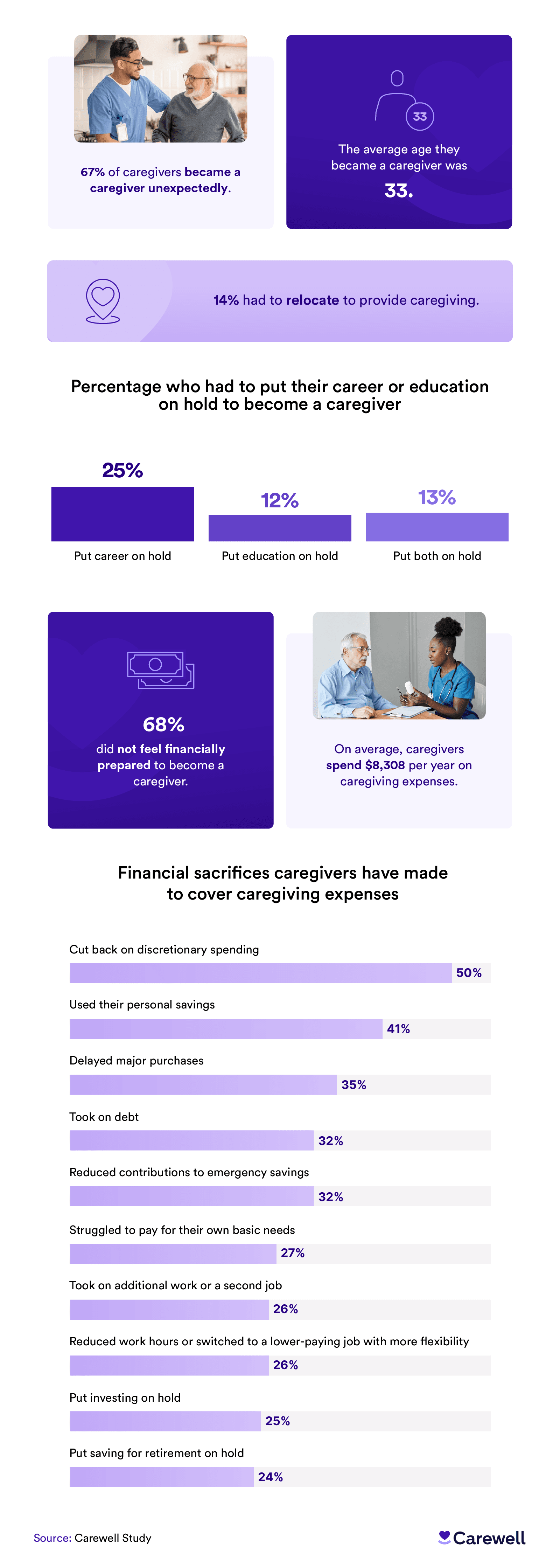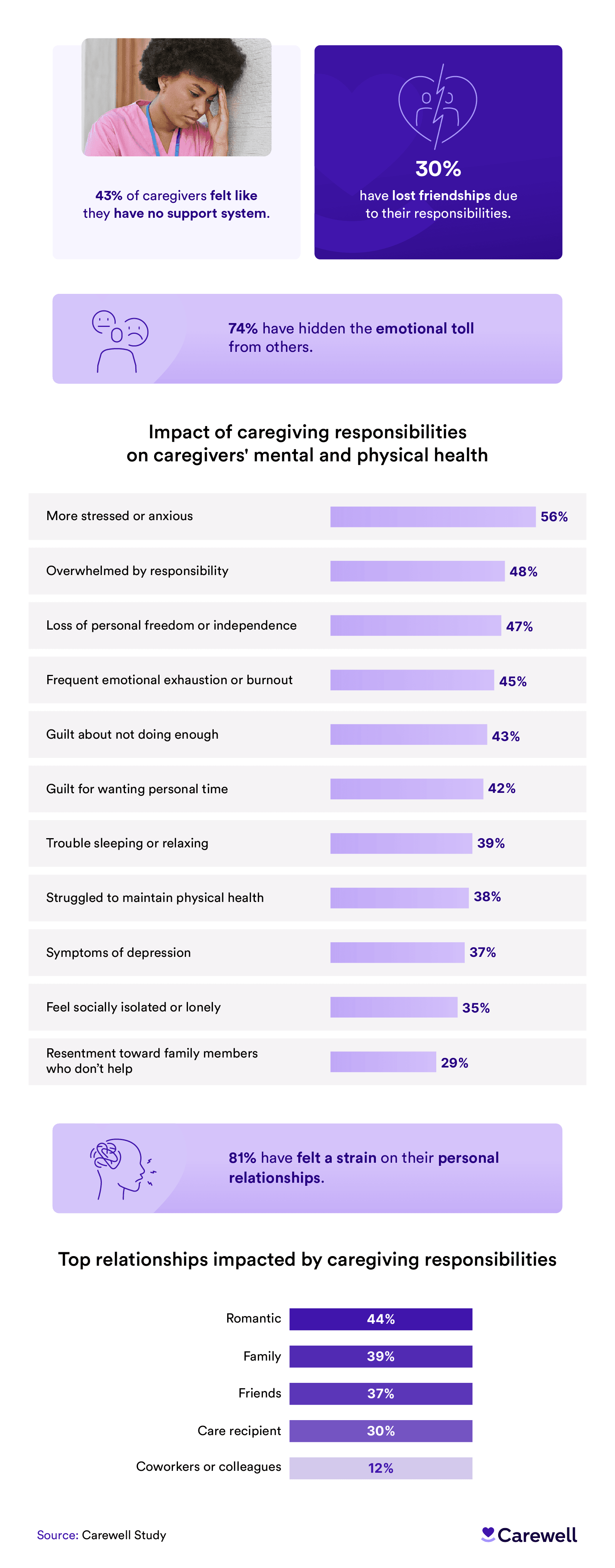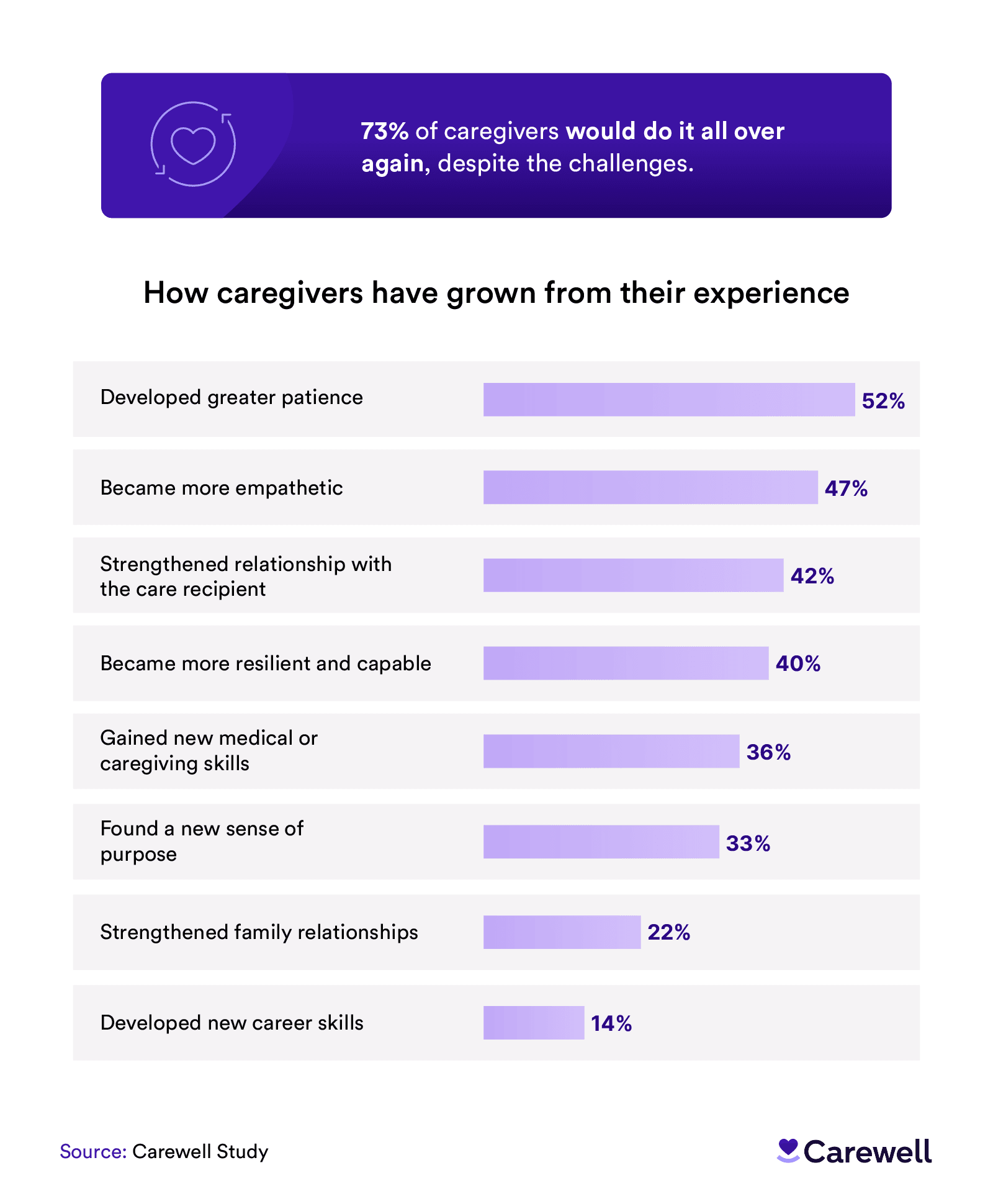Caregiving often arrives in our lives unannounced and becomes a journey that brings moments of connection alongside inevitable hurdles. While many caregivers experience financial pressures and emotional fatigue, there's comfort in knowing that helping hands are within reach and you don't need to walk this path alone. Our survey of 1,000 caregivers reveals their experiences and highlights ways to support these everyday heroes.
Key Takeaways
67% of caregivers became a caregiver unexpectedly.
25% of caregivers have had to put their careers on hold due to caregiving responsibilities.
41% of caregivers have had to use personal savings to cover caregiving costs, and 32% have gone into debt because of it.
24% of caregivers have had to pause their retirement savings.
43% of caregivers feel they have no support system.
The True Cost of Caregiving
Becoming a caregiver often comes with challenges — emotionally, physically, and financially. Many find themselves making major life adjustments, from pausing their careers to dipping into savings, all to provide the care their loved ones need.

Caregiving arrived without warning for 67% of those we surveyed. This sudden shift turned life upside down and led to major life changes for some: 25% of caregivers had to pause their careers, and 21% of Gen Z caregivers had to put their education on hold.
Money was another big challenge. More than 2 in 5 caregivers (41%) have dipped into their personal savings, and 32% took on debt to cover expenses. On top of that, 24% had to stop saving for retirement. If you're in this boat, know that you're not alone. Looking into financial assistance grants or even talking to a financial advisor could help lighten the load.
The Emotional and Social Toll of Caregiving
Caregiving can be tough emotionally, leaving some caregivers feeling overwhelmed or alone. Here's a look at the impact and some ways to find support and relief.

Caregiving can be rewarding, but it also takes an emotional and social toll. Some caregivers (43%) felt like they lacked a support system. Over half (56%) reported feeling increased stress and anxiety since becoming a caregiver. The weight of new responsibilities felt overwhelming for 48%, and 45% frequently experienced emotional exhaustion or burnout. If you're feeling this way, know that it's okay to ask for help.
Caregiving impacts personal relationships, too, with 81% of caregivers saying it takes a toll. Romantic relationships suffer the most, but 39% reported strained family ties, and 29% resented relatives who don't pitch in. Younger caregivers faced unique struggles — 34% of Gen Z caregivers have lost friendships.
Prioritizing self-care and seeking community caregiving resources (like support groups or respite care) can help caregivers navigate these challenges, maintain their well-being, and strengthen their support systems. Connecting with others who understand your experience can provide comfort, while taking breaks and setting boundaries can prevent burnout.
The Silver Linings of Caregiving
Caregiving also brings moments of connection and personal growth. Many caregivers say the experience has made them more patient, empathetic, and even closer to their loved ones.

For many caregivers, the experience has fostered personal growth and stronger relationships. More than 2 in 5 (42%) said caregiving deepened their bond with the person they care for, while 52% have gained greater patience and 47% have become more empathetic. It can also open new doors — 14% have even developed career skills through their caregiving journey.
Caregiving With Support: Finding Strength in Community
Caregiving has its share of challenges, but it also brings moments of strength, connection, and growth. While many caregivers face financial strain, emotional stress, and shifts in their personal lives, support and resources can make a difference. Whether seeking government assistance for caregivers or turning to your community, help is available. No caregiver should have to do it alone, and finding the right support can make all the difference.
Methodology
We surveyed 1,000 caregivers on February 25, 2025, to explore the financial and emotional impacts of caregiving. Of the respondents, 10% were Gen Z, 55% were millennials, 28% were Gen X, and 7% were baby boomers. Percentages not totaling 100% are due to rounding. Survey responses are self-reported.
About Carewell
Carewell is a labor of love, founded by a family passionate about supporting caregivers and their loved ones. We know firsthand the challenges and triumphs of the caregiving journey, and we're here to make your path a little smoother. With a carefully selected range of products and a team that truly cares, we're committed to being your trusted partner in providing exceptional care at home.
Fair Use Statement
This data is available for noncommercial use—please ensure you link to this page when referencing it.





